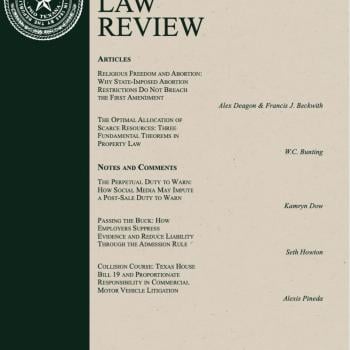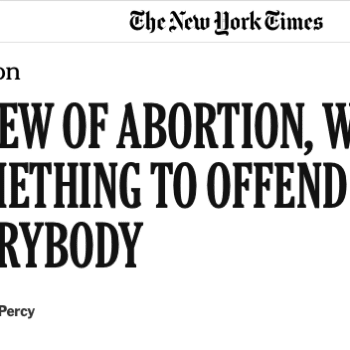Karen, in the combox in a previous post, raises this concern:
Persons get to sue. If this law passes [i.e., the Mississippi personhood amendment], miscarried embryos can sue their mothers for negligence that resulted in the miscarriage. Examples of things that cause early miscarriage are bicycling, horseback riding, breastfeeding, drinking coffee, tea, and alcohol. Insurance companies face astounding potential liability for covering restaurants or holiday camps that allow women of childbearing age to engage in those activities. Given what ‘prolifers’ think about women who have the gall to exist in public, I find it extremely easy to imagine you suing the Mississippi restaurant association for permitting women to drink beer or eat fat, causing an untold number of embryonic deaths. Suddenly insurance companies refuse to cover any entity that allows women to do anything that could cause a miscarriage, including things like work at most any factory job or health care position.
Please don’t insult my intelligence by saying this could never ever happen because you all LOOOVVEEE women so much. Under this law embryos are persons; persons can sue in civil court; one of you could file suit on behalf of all embryos who are damaged by the fact that their mothers had the unmitigated gall to leave the house.
For the record, I have no idea what I think about the Mississippi personhood amendment, since I have not kept up with the debate about it. My initial and untutored reaction, however, is that given the composition of the U. S. Supreme Court, these sorts of amendments are a bad idea. For they will merely allow the Court to once again reinforce the right to abortion. Nevertheless, what interests me is Karen’s argument. As luck would have it, I address two similar arguments in my book, Defending Life: A Moral and Legal Case Against Abortion Choice (Cambridge University Press, 2007), 170-171. Here’s what I write (citations omitted):
If the Unborn Is Considered a Moral Subject under the Law, Would It Not Follow That Pregnant Women Would Be Prohibited from Smoking, Drinking Alcohol, or Engaging in Other Activities That May Harm the Unborn?
The fact that smoking and drinking alcohol during pregnancy can harm the unborn is well documented in the medical and scientific literature. Consequently, because such activity is harmful to the unborn, and the unborn are moral subjects, a mother has a moral responsibility to make sure her unborn child is not harmed, just as she does after the child’s birth. However, whether the intrusive policing of such harmful activity should be a fixed point of our criminal law is another question.My view is the one proposed by Schwarz, who draws an analogy with the “born child [who] has a right to good health care, proper diet, protection from harmful
effects.” He points out, however, that although “to some extent this right can be enshrined in law, to a large extent it cannot. We cannot have police at the family dinner table ensuring that the child gets all the nourishing food and vitamins he needs. Nor can he be protected from all harmful effects in the home, parallel to the harmful effects for the preborn child from his mother’s smoking [or drinking].” Yet, Schwarz concludes, “surely the born child’s right to live must be enshrined in the law, and given the same legal protection the rest of us enjoy. Exactly the same applies to that child before he is born.”
It should be noted, as Schwarz points out, that the question assessed in this section really does not help the abortion-choice position, because the same question can be asked to the abortion-choice supporter who argues that the being in the womb is not an actual person but only a potential person. After all, if the child is brought to term, the pregnant woman’s behavior, though immediately impacting the development of the fetus while she is carrying it, will result in harm and suffering to the fetus after it is born. Therefore, “the wrongness of smoking [or drinking] while pregnant is no way removed, or even mitigated, by adopting the view that no person is present in the womb. Correspondingly, if smoking [or drinking] is already wrong on the assumption the ‘fetus’ is merely a
potential person, nothing significant is changed or added when we come to realize that he is already a person, an actual person.” Consequently, the objection raised in the question assessed in this section applies to the “potential person” view as well.Furthermore, if abortion is made illegal because the law recognizes the unborn as moral subjects, then the unborn will be treated as born children. And just as the law presumes that the parents of born children have the best interests of their children in mind, the law will presume the same about the parents of unborn children. Therefore, unless the state has a very good reason to suspect that the activities of the parents are causing harm to their unborn child (as it would have to for parents of born children), the state has to presume that the parents are acting in a way that has the best interests of their child in mind.
If the Unborn Is Considered a Person under the Law, Would Not All Miscarriages Be Suspect and Would Not Women Have to Prove That Their Miscarriages Were Not Elective Abortions?
No. First, this question is a crass appeal to fear. People die all the time, but we do not ask those closest to the deceased to prove that they did not commit a murder. After all, in our criminal law one is presumed innocent until proven guilty. If the unborn are considered moral subjects under the law, this would be true of women who have had miscarriages as well.
Second, all miscarriages would not be suspect, but only those for which there are reasonable grounds to suspect that deliberate killing was involved. This is how we treat the deaths of children whose demise was the result of an apparent accident. If there is evidence to suspect that the born child was abused and her death was the result of someone’s negligence or premeditated act, then an investigation ought to be conducted. If there is no evidence, then the parents ought to be left alone to mourntheir loss. The same principle would apply to miscarriages.












